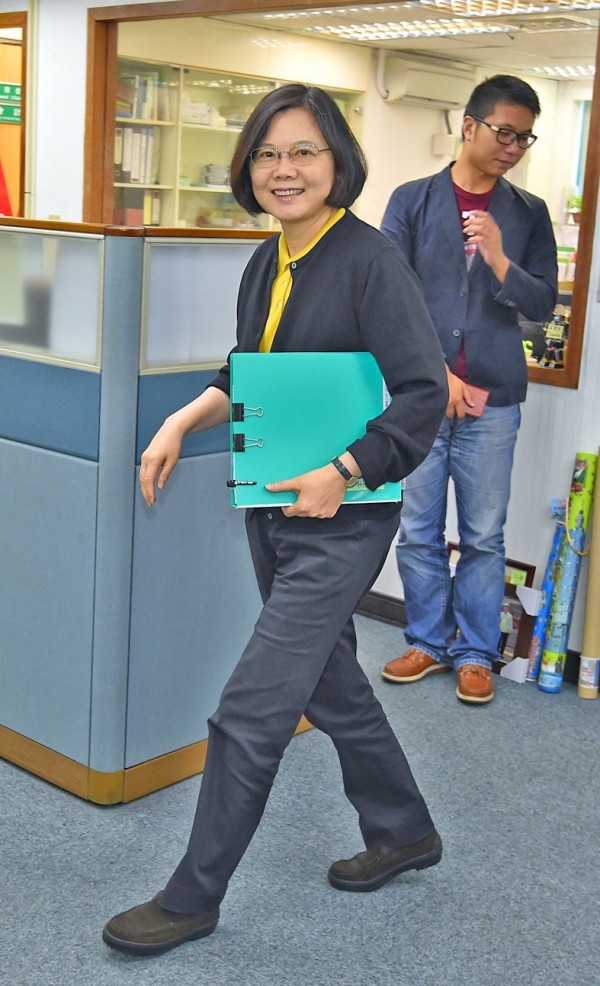《TAIPEI TIMES 焦點》 No ‘consensus’ in Tsai speech: report

President-elect Tsai Ing-wen smiles at reporters before hosting a Democratic Progressive Party Central Standing Committee meeting yesterday at the party’s headquarters in Taipei. Photo: Liu hsin-de, Taipei Times
INAUGURATION: The speech would consist of three points: the significance of the third transfer of power, the predicaments facing Taiwan and cross-strait policies, a source said
By Stacy Hsu / Staff reporter
President-elect Tsai Ing-wen (蔡英文) yesterday declined to confirm a media report that the so-called “1992 consensus” is to be omitted from her inauguration speech on Friday next week, which has been the subject of much rumor and speculation.
Citing an unidentified source in Tsai’s camp, the Chinese-language Next Magazine yesterday reported that despite Beijing’s repeated attempts to browbeat Tsai into taking a public stance on the “1992 consensus” and the “one China” principle, the president-elect has decided to mention neither in her inaugural speech as a way of responding to her mandate from the electorate.
“The problem with cross-strait issues does not lie in whether Tsai is willing to recognize the ‘1992 consensus’ or the ‘one China’ principle, but rather if these concepts are accepted by the majority of Taiwanese,” the source was quoted as saying.
“It is impossible for the new Democratic Progressive Party [DPP] government to fall in line simply because of Beijing’s intimidation,” the source said, urging China to realize that the DPP would not follow in the footsteps of the Chinese Nationalist Party (KMT), a party that supports the “1992 consensus” and the “one China” principle, and which was voted out of office in January.
The “1992 consensus” — a term former Mainland Affairs Council chairman Su Chi (蘇起) admitted making up in 2000 — refers to a tacit understanding between the KMT and the Chinese Communist Party that both sides acknowledge there is “one China,” with each side having its own interpretation of what “China” means.
The magazine also quoted a member of Tsai’s speech-writing team as saying that the DPP chairperson’s speech consists of three main points: the significance of the nation’s third transfer of power, the predicaments facing Taiwan and her cross-strait policies.
“For cross-strait policies, Tsai is to stick to the fundamentals ... and will reiterate her determination to maintain the ‘status quo’ based on Taiwan’s internal consensus, as it is by far the most beneficial option for all concerned parties,” the team member said.
When asked by reporters whether the “1992 consensus” is indeed absent from her speech, Tsai simply smiled and did not reply as she walked into a meeting of the DPP’s Central Standing Committee in Taipei yesterday.
Speculations about what tone Tsai is going to adopt toward China in her speech has been growing, particularly following a spate of incidents where Beijing has stepped up its efforts to belittle Taiwan in the international arena.
Most notably, the incidents included the forced deportation of Taiwanese fraud suspects to China last month and the unprecedented “one China” proviso attached to Taiwan’s invitation for this year’s World Health Assembly meeting.
DPP spokesman Ruan Jhao-syong (阮昭雄) yesterday downplayed China’s Taiwan Affairs Office spokesman Ma Xiaoguang’s (馬曉光) remarks that “the ball is in the court of Taiwan’s new leader” in terms of the future direction of cross-strait ties.
Praising the “1992 consensus” as an integral part of the cross-strait “status quo,” Ma said both sides could continue their amicable interactions should the incoming government recognize the “1992 consensus.”
“We are not asking any more from Taiwan’s new leader other than what we have already asked for since 2008,” Ma told a news conference in Beijing yesterday.
Ruan said Tsai’s stance on cross-strait issues has been unequivocal, which is to maintain the “status quo,” Taiwan’s freedom and democracy, and peaceful and stable cross-strait development.
“This stance is not only in the best interests of all parties, but is also backed by the consensus opinion of Taiwanese,” Ruan said, adding that responsibility for maintaining cross-strait peace and stability lies with both Beijing and Taipei.
新聞來源:TAIPEI TIMES















